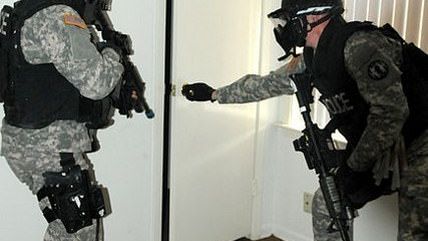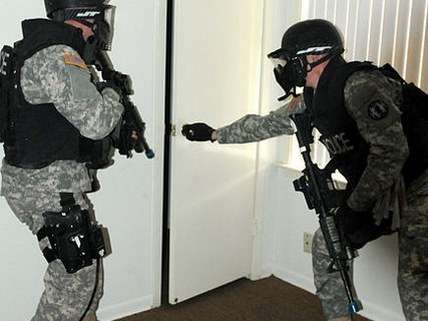Can Cops Invade Your Home Just Because You're Scared of Them? Could Be.


In the wake of news reports of the invasion of Louise Goldsberry's home by US Marshal Matt Wiggins and a posse of 30 or so federal and local cops, Tom Lyons, the Sarasota Herald-Tribune reporter who originally covered the case, asked a very good question: Was it legal for the officers to use Goldsberry's frightened reaction to having a gun pointed at her through her kitchen window as a pretext for searching her home? That's the sort of question more journalists should ask. But the answer is a bit murky, leaning toward unsettling.
Writes Lyons:
A Sarasota lawyer emailed me to insist that was an illegal entry, flagrant and simple. But the more I have read — and after asking the past president of the Sarasota County Bar, Derek Byrd — the more that became unclear.
Byrd says it sounds improper, and may well have been. But the big argument would be about why police thought a suspect was in that apartment. …
From what Byrd can see, "they didn't have enough." But he said it could depend on the information that brought them there.
An anonymous tip?
"That has zero credibility," Byrd said.
But if the agent could provide more information to a judge, it might become more convincing.
Even so, there is the issue of Wiggins suddenly assuming he had the right door in the complex because of Goldsberry's reaction.
"Things can happen that legitimately arouse suspicions," Byrd said, and police can act on reasonable conclusions.
The magic phrase here is "exigent circumstances," which is sort of a legal hex cast by law enforcement officers to make the Fourth Amendment go away. On a more serious note, courts let police enter premises if police have probable cause, or reason to fear loss of evidence or danger to people if they wait for a warrant.
As you might guess, exigent circumstances can be in the eye of the beholder, who is always wearing a badge, and they tend to broaden in definition with time. Law professor and legal blogger Jonathan Turley uses the Goldsberry case as an example of just how loosely the term is being interpreted. As he puts it, "So, police can show up in what looks like a hunting vest at a kitchen window and point a gun into the face of a woman. If she screams and crawls away, that is sufficient to bust into the apartment, drag the occupants outside, and handcuff them in public."
That the "exigent circumstance" in this case was created by the police themselves by pointing a gun through a window and scaring the shit out of an innocent woman would seem to raise some doubts about the righteousness of this particular home invasion, but even that is uncertain. The US Supreme Court addressed the issue of police-created exigencies in the case of Kentucky v. King. Samuel Alito wrote for the majority, "The exigent circumstances rule applies when the police do not create the exigency by engaging or threatening to engage in conduct that violates the Fourth Amendment."
Pointing a gun through a kitchen window may be cruel and insane, but it may not, in itself, threaten to violate the Fourth Amendment — just human decency. The FBI provides the following guidance on its Website with regard to police-created exigent circumstances:
In holding that the exigent circumstances exception applies as long as the police do not gain entry to premises by means of an actual or threatened violation of the Fourth Amendment, the Court eliminated the confusion inherent in the tests used by the lower courts. The rule announced by the Court clearly allows officers confronted with circumstances, such as those present in King, to take appropriate steps to resolve the emergency situation. However, officers must be mindful of the fact that they cannot demand entry or threaten to break down the door to a home if they do not have independent legal authority for doing so. According to the Court, to do so would constitute an actual or threatened violation of the Fourth Amendment and, thereby, deprive the officers of the ability to rely upon the exigent circumstances exception.
So long as the conduct of Wiggins and company isn't interpreted as threatening to enter Goldsberry's home without her consent, they may be in the clear, Fourth Amendment-wise (though I'd like to think threatening an innocent person in her own home with a deadly weapon would be otherwise actionable).
As Lyons concludes:
That's why your castle is only secure from a warrantless police invasion until a cop decides, without asking any judge, that he has cause to go in. If he kills you while doing it, guess who gets blamed?


Show Comments (59)